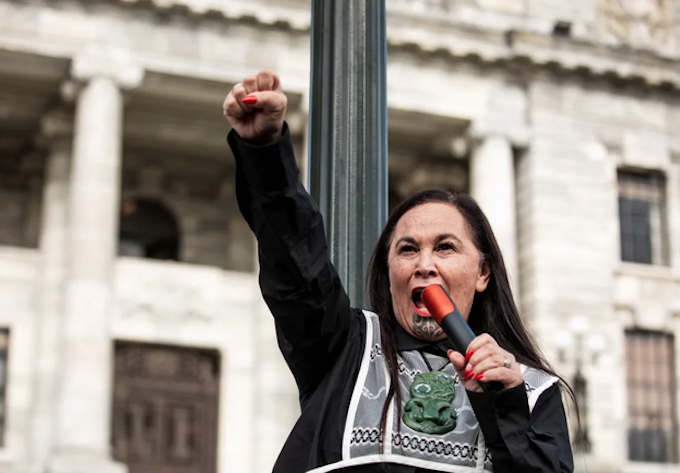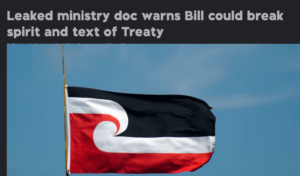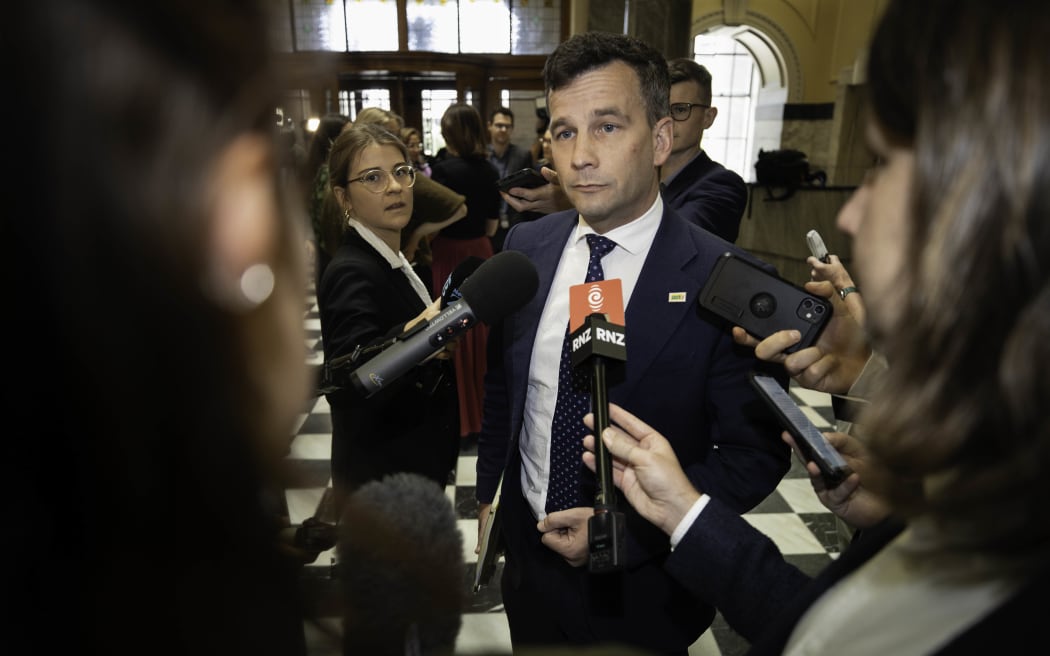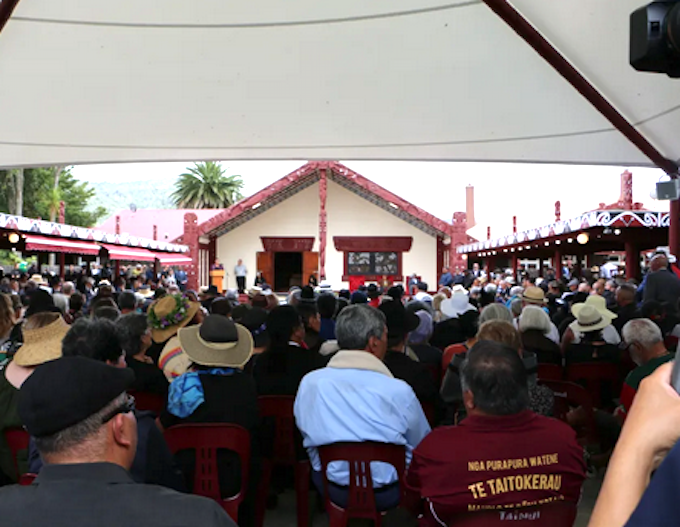
New Zealand’s opposition parties have seized on a leaked ministerial memo about the coalition government’s proposed Treaty Principles bill, saying the prime minister should put a stop to it.
ACT is defending the bill, while National has repeated its position of supporting it no further than select committee.
Te Pāti Māori co-leader Rawiri Waititi posted a screenshot of part of a page of the leaked document on social media on Friday, saying it showed the government’s “intentions to erase Te Tiriti o Waitangi”.
- READ MORE: More than 10,000 turn out for NZ’s national Hui-ā-Iwi at Tūrangawaewae
- NZ government confirms leaked document was a ministry Treaty Principles bill memo
- Luxon defends decision not to attend nationwide hui
- RNZ live news feed

1News also reported that it had a full copy of the leaked report, which it said warned the proposal’s key points were “at odds with what the Treaty of Waitangi actually says”.
Ministry of Justice chief executive Andrew Kibblewhite confirmed the leak “of a draft paper seeking to include the Treaty of Waitangi Bill in the Legislation Programme for 2024” would be investigated.
“We are incredibly disappointed that this has happened. Ministers need to be able to trust that briefing papers are treated with utmost confidentiality, and we will be investigating the leak as a priority.
“All proposed Government Bills are assigned a priority in the Legislation Programme. The draft paper was prepared as part of that standard process, and had a limited distribution within the Ministry of Justice and a small number of other government agencies.
“We will be keeping Minister [of Justice Paul] Goldsmith informed on our investigation and will not be making any further comment at this stage.”
ACT: ‘That is what I believe our country needs’
The bill was an ACT Party policy during the election, which National in coalition negotiations agreed to progress only as far as the select committee stage. Prime Minister Christopher Luxon in Parliament last year said “that’s as far as it will go”.
Party leader David Seymour defended the bill.
“Over the last 40 years, the principles of the Treaty have evolved behind closed doors with no consultation of the average New Zealander, no role for them to play in it whatsoever,” he said.

That referred to the courts’ attempts over the last few decades to reconcile the differences between the English and reo Māori texts of the Treaty, based in part on the findings of the Waitangi Tribunal — an independent body set up by a previous National government to examine the Treaty’s role in New Zealand.
Seymour said people in the bureaucracy had become set in that way of thinking about the Treaty, but that it had made the country feel more divided by race.
“And when ACT comes along and says, ‘hey, we need to have an open discussion about this and work towards a unified New Zealand’, you expect that they’re going to be resistant. Nonetheless, there’s the band aid this government has, and that is what I believe our country needs.
“I believe that once people see an open and respectful debate about our founding document and the future of our constitutional settings, that’s actually something that New Zealanders have been wanting for a long time that we’re delivering, and I suspect it might be a bit more popular than the doomsayers anticipate.”
In a statement, he said the party was speaking for Māori and non-Māori alike who believed division was one of the greatest threats to New Zealand.
“We’re proposing a proper public debate on what the principles of the Treaty actually mean in the context of a modern multi-ethnic society with a place in it for all.
“ACT’s goal is to restore the mana of the Treaty by clarifying its principles. That means the New Zealand government has the right to govern New Zealand, the New Zealand government will protect all New Zealanders’ authority over their land and other property, and all New Zealanders are equal under the law, with the same rights and duties.”
He said they would be consulting all New Zealanders on it, and once it got to select committee they would have a chance to recommend changes to the bill, which would then be put to the public as a referendum.
Te Pāti Māori: ‘The worst way of rewriting the Tiriti’
Te Pāti Māori co-leader Debbie Ngarewa-Packer told RNZ News she was not surprised to see ministry officials warning against the bill.
“The extent and the depth of the erasing of Tangata Whenua, the arrogance to assume to rewrite a Treaty based on one partner’s view — and that was a partner who only had 50 rangatira sign — is really alarming.”
She said she did not trust Prime Minister Christopher Luxon would not support the bill any further than the select committee stage.
“It’s the worst way of rewriting the Tiriti we could ever have expected, it’s made assumptions that don’t exist and again has highlighted that they rate the English version of te Tiriti.
“I’m not quite sure when the last time you could believe everything a prime minister said was factual,” she said.
“The prime minister has been caught out in his own lies . . . the reality is that a clever politician and intentional coalition partner will roll anyone out of the way to make sure that something as negatively ambitious as what this rewrite is looking like can happen.”
She said one of Māoridom’s biggest aspirations was to be a thriving people “and ensure that through our whakapapa te Tiriti is respected”, she said, criticising Luxon’s refusal to attend this weekend’s national hui.
“He didn’t have to be the centre of all the discussions, a good leader listens,” she said.
Labour: ‘A total disgrace and a slap in the face for the judiciary’
Labour’s Māori Development spokesperson Willie Jackson however said the bill was a “total breach” of the Treaty, its obligations, and the partnership between Māori and the Crown.
“It’s a total attack on the Treaty and the partnership that we have, that Māori have with the Crown, and it continues the negative themes from this government from day one.
“The reality is that the Treaty principles — in terms of what’s been drawn up in terms of the ‘partnership’ — was already a compromise from Māori. That’s why the judiciary wrote up the partnership model — so if they want to go down this track they’ll open up a can of worms that they’ll live to regret.”
He said the government should not be pushing ahead with the bill.
“Absolutely, absolutely not, and Luxon should show some leadership and rule it out now. This is a disgrace, what ACT are doing, a total disgrace and a slap in the face for the judiciary and all the leaders who in past years have entrenched the partnership.
“You’re talking about National Party leaders like Jenny Shipley, Jim Bolger, Doug Graham, John Key. This is just laughable and idiotic stuff that is coming from Seymour, and Luxon should shut this down now because it goes in the face of legal opinion, legal history, judiciary decisions since 1987, prime ministerial decisions from National and Labour.
“All of a sudden we’ve got this so-called expert Seymour who thinks he knows more than every prime minister of the last 40 years and every High Court judge, Supreme Court judge — you name it … absolute rubbish and it should be thrown out.”
He said Seymour was “trying to placate his money men . . . trying to placate some of his extreme rightwing mates”.
He did not trust the government to do as Luxon had said it would, and end support for the bill once it reached select committee.
“I mean surely this government would be the last group of people you’d trust right now wouldn’t you think? These are people that are going to disband our magnificent smokefree laws to look after their tax cuts.
“They also must be told in no uncertain terms that there can be no compromise on the Treaty relationship.”
Greens: ‘All of the kupu are a breach’
Green Party Māori Development spokesperson Hūhana Lyndon also said the government should not proceed with the bill, arguing all the words proposed by ACT for replacing the principles were a breach of the Treaty itself.
“All of the kupu are a breach to Te Tiriti o Waitangi, and this is the choice of the National government to allow this to go ahead into select committee. There’s been no consultation with te iwi Māori or the general public.
“The government shouldn’t proceed with it. Te Tiriti o Waitangi is Te Tiriti o Waitangi — and those words need to be given effect to by the government, any changes to Te Tiriti o Waitangi is between hapū, iwi and the Crown.”
She said the new words proposed to assert a specific interpretation of te Tiriti and its historical context “does not give effect to te Tiriti and does not honour the sacred covenant that our tūpuna signed up for”.
“Ultimately, as we can see, even the government advice is cautioning strongly that the proposed words in the Treaty principles bill will be contentious, and could splinter — and, in fact, undermine — the strong relationship of te iwi Maori with the Crown to date as we have our ongoing conversation around how we honour te Tiriti o Waitangi.
“As we’ve seen with this government thus far, they are rushing through bad legislation under urgency, and this is no different to what we saw before Christmas.”

National: ‘It’s just a simple coalition agreement’
National’s Justice Minister Paul Goldsmith repeated to RNZ the party’s stance was to only progress it as far as the select committee, and no further.
“That’s what the prime minister has indicated,” he said. Asked why the government was even supporting it that far, he said it was part of the coalition agreement.
“Look, it’s just a simple coalition agreement that we have with the ACT Party, we agreed to support it to the select committee so that these matters can be given a public hearing, people can debate it. And so that was the agreement that we had.
“The process that we’ve got will introduce a bill that will have the select committee hearing, lots of different views on it and its merits.”
Asked about National’s position on whether the Treaty principles needed to be defined in law, he said their position was very clear, “that we support this piece of legislation going to the Select Committee and that’s as far as our support goes”.
He rejected Waititi’s suggestion it was an attempt to erase the Treaty.
“Look, I think there’ll be a lot of inflamed rhetoric over the coming weeks, and I’m not going to contribute to that . . . there’s no intention whatsoever to erase the Treaty and that’s not what this bill would do.”
When asked about the memo’s author saying the bill would be in opposition to the Treaty itself, he said the memo was a draft and the matter would be debated at select committee.
This article is republished under a community partnership agreement with RNZ.














































